

Nous faudra-t-il payer pour préserver notre vie privée sur l’internet. "Dans le business de la publication, les lecteurs sont les produits et les consommateurs sont les publicitaires", affirme Dave Winer, paraphrasant une citation célèbre : "Si vous ne voyez pas le produit, c'est que vous êtes le produit".
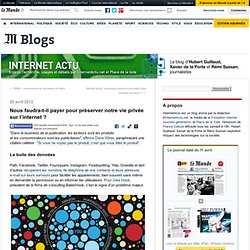
La bulle des données Path, Facebook, Twitter, Foursquare, Instagram, Foodspotting, Yelp, Gowalla et tant d'autres récupèrent les numéros de téléphone de nos contacts et leurs adresses e-mail sur leurs serveurs pour faciliter les appariements, bien souvent sans même en demander la permission ou en informer les utilisateurs. Pour Uwe Hook, président de la firme de consulting BatesHook, c'est le signe d'un problème majeur. Image : Nous sommes cernés par les bulles de données, expliquait Eli Pariser lors de sa présentation à TED (vidéo).
Image extraite de sa présentation. Online chats, off the record: Cryptocat puts privacy back on the Web. Un routeur VPN Host-to-LAN en utilisant OpenVPN. Le but de ce document est de décrire la façon de configurer une routeur OpenVPN pour le Host-to-LAN Virtual Private Network.
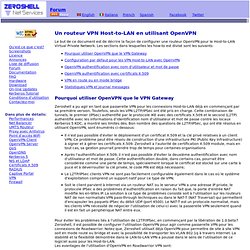
Les sections dans lesquelles les how-to est divisé sont les suivants: Pourquoi utiliser OpenVPN que le VPN Gateway Interface web OpenVPN. Cliquez sur l'image pour l'agrandir. The How-To Geek Guide to Getting Started with TrueCrypt. If you’re looking for a simple and powerful way to encrypt everything from system drives to backup discs to everything in between, TrueCrypt is an open-source tool that will help you lock up your files.
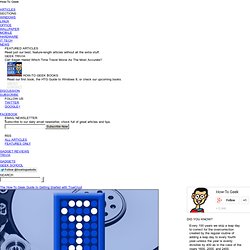
Read on as we show you how to get started. What Is TrueCrypt and Why Should I Use It? TrueCrypt is an on-the-fly encryption application that allows you to work with encrypted files as you would work on files located on a regular drive. Without on-the-fly encryption, actively working with encrypted files is an enormous pain and the outcome is usually either that people simply do not encrypt their files or they engage in poor security practices with their encrypted files because of the hassle of decrypting/encrypting them.
How to Optimize Mozilla Firefox for Maximum Privacy. Firefox includes powerful features to prevent you from being tracked online, but they aren’t on by default.
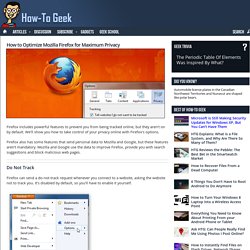
We’ll show you how to take control of your privacy online with Firefox’s options. Firefox also has some features that send personal data to Mozilla and Google, but these features aren’t mandatory. Mozilla and Google use the data to improve Firefox, provide you with search suggestions and block malicious web pages. Do Not Track Firefox can send a do-not-track request whenever you connect to a website, asking the website not to track you. Click the Firefox menu, select Options and click the Privacy icon. Click the “Tell websites I do not want to be tracked” check box at the top of the privacy pane to enable the do-not-track feature.
How To Make VPNs Even More Secure. From being a niche product used by the few, in the past few years VPN services have hit the big time.
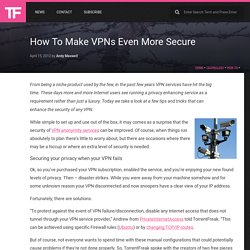
These days more and more Internet users see running a privacy enhancing service as a requirement rather than just a luxury. Today we take a look at a few tips and tricks that can enhance the security of any VPN. While simple to set up and use out of the box, it may comes as a surprise that the security of VPN anonymity services can be improved. Of course, when things run absolutely to plan there’s little to worry about, but there are occasions where there may be a hiccup or where an extra level of security is needed. Securing your privacy when your VPN fails Ok, so you’ve purchased your VPN subscription, enabled the service, and you’re enjoying your new found levels of privacy. How to secure your computer and surf fully Anonymous BLACK-HAT STYLE.
Cops Can Copy iPhone Contents In Less Than 2 Minutes Published on April 10, 2012 by admin · 1 Comment NextWeb It has emerged that Michigan State Police have been using a high-tech mobile forensics device that can extract information from over 3,000 models of mobile phone, potentially grabbing all media content from youriPhonein under two minutes. The CelleBrite UFED is a handheld device that Michigan officers have been using since August 2008 to copy information from mobile phones belonging to motorists stopped for minor traffic violations. The device can circumvent password restrictions and extract existing, hidden, and deleted phone data, including call history, text messages, contacts, images, and geotags. ODDNS: Decentralized and Open DNS To Defeat Censorship. For the last couple of years discussion around censorship of websites in the West has become as prolific as the that around already established blockades in countries such as China and Iran.
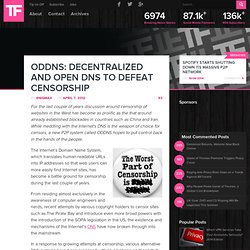
While meddling with the Internet's DNS is the weapon of choice for censors, a new P2P system called ODDNS hopes to put control back in the hands of the people. The Internet’s Domain Name System, which translates human-readable URLs into IP addresses so that web users can more easily find Internet sites, has become a battle ground for censorship during the last couple of years. From residing almost exclusively in the awareness of computer engineers and nerds, recent attempts by various copyright holders to censor sites such as The Pirate Bay and introduce even more broad powers with the introduction of the SOPA legislation in the US, the existence and mechanisms of the Internet’s DNS have now broken through into the mainstream. WikiLeacks. La surveillance massive d’Internet révélée. Big Brother Arrives Via Facebook And He's Your Friend. Personal data as new Currency? Staying connected on your smartphone can also come with privacy concerns.
CLEVELAND - A new survey by Nielsen found that 43 percent of mobile phone users in the U.S. now have a smartphone.
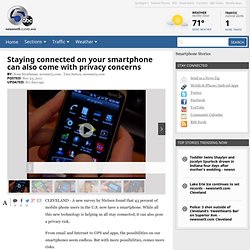
While all this new technology is helping us all stay connected, it can also pose a privacy risk. From email and Internet to GPS and apps, the possibilities on our smartphones seem endless. But with more possibilities, comes more risks. Many may forget, but your smartphone is a handheld computer, and when you browse the internet you're sending and receiving information through the air.